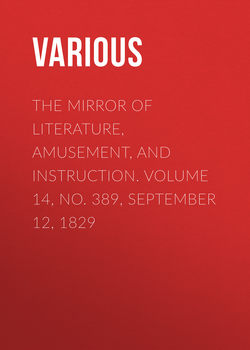Читать книгу The Mirror of Literature, Amusement, and Instruction. Volume 14, No. 389, September 12, 1829 - Various - Страница 2
RETROSPECTIVE GLEANINGS
ОглавлениеMONKISH VERSES
(For the Mirror.)
MIRROR, vol. xii. pp. 98, 165
The following is said to have been the epitaph on the tomb of Fair Rosamond, at Godstow:—
Hic jacet in tomba, Rosamundae non Rosamundi,
Non redolet sed olet quae redolere solet.
TRANSLATED
Within this tomb lies the world's fairest rose;
Whose scent now charms not, but offends the nose.
MIRROR, vol. xiii. p. 98
The couplet on York Minster, translated.
As of all flowers the rose is still the sweetest,
So of all churches this is the completest.
On the stone in the coronation chair in Westminster Abbey.
Ni fallat fatum, Scoti quocunque loquitur,
Inveniant lapidem, regnare teneter ibidem.
TRANSLATED
Unless old proverbs fail, and wizard's wits be blind,
The Scots shall surely reign, where'er this stone they find.
Luther sent a glass to Dr. Justus Jonas, with the following verses:—
Dat vitrum vitro, Jonae, vitro ipse Lutherus,
Se similem ut fragili noscat uterque vitro.
TRANSLATED
Luther a glass, to Jonas Glass, a glass doth send,
That both may know ourselves to be but glass, my friend.
PRIOR
MIRROR, vol. xii. p. 184
Prior's epitaph on himself was parodied as follows:—
Hold Mathew Prior, by your leave,
Your epitaph is very odd:
Bourbon and you are sons of Eve,
Nassau the offspring of a God.
Which being shewn to Swift he wrote the following:—
Hold, Mathew Prior, by your leave,
Your epitaph is barely civil;
Bourbon and you are sons of Eve,
Nassau the offspring of the devil.
In the "Spectator," is part of an epitaph by Ben Jonson, on Mary Herbert, Countess of Pembroke, and sister of Sir Philip Sidney. The following is the whole, taken from the first edition of Jonson's works, collected as they were published:—
Underneath this stone doth lie,
As much virtue as could die;
Which when alive did vigour give,
To as much beauty as could live;
If she had a single fault,
Leave it buried in this vault.
Another on the same, from the same source:—
Underneath this sable hearse,
Lies the subject of all verse,
Sidney's sister, Pembroke's mother,
Death ere thou hast slain another,
Fair, and good, and learn'd as she,
Time shall throw a dart at thee;
Marble piles, let no man raise
To her fame; for after days,
Some kind woman born as she,
Reading this, like Niobe,
Shall turn statue and become
Both her mourner and her tomb.
A CORRESPONDENT.
The Londiners pronounce woe to him, that buyes a horse in Smith-field, that takes a Seruant in Paul's Church, that marries a Wife out of Westminster. Londiners, and all within the sound of Bow-Bell, are in reproch called Cocknies, and eaters of buttered tostes. The Kentish men of old were said to haue tayles, because trafficking in the Low Countries, they neuer paid full payments of what they did owe, but still left some part vnpaid. Essex men are called calues, (because they abound there,) Lankashire eggepies, and to be wonne by an Apple with a red side. Norfolke wyles (for crafty litigiousness:) Essex stiles, (so many as make walking tedious,) Kentish miles (of the length.)
—Moryson's Itinerary, 1617.
ORIGIN OF THE WORD SMECTYMNUUS
(For the Mirror.)
This was a cant term that made some figure in the time of the Civil War, and during the Interregnum. It was formed of the initial letters of the names of five eminent Presbyterian ministers of that time, viz. Stephen Marshall, Edmund Calamy, Thomas Young, Matthew Newcomen, and William Spenstow; who, together, wrote a book against Episcopacy, in the year 1641, whence they and their retainers were called Smectymnuans. They wore handkerchiefs about their necks for a note of distinction (as the officers of the parliament-army then did) which afterwards degenerated into cravats.
P.T.W.
CIVIC FEAST IN 1506
(For the Mirror.)
In the court room of Salters' Hall there appears, framed and glazed, the following "Bill of fare for fifty people of the Company of Salters, A.D. 1506."
CURIOS.
